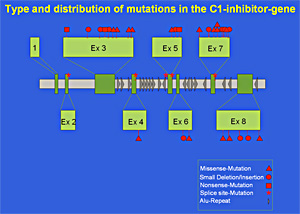Research : Hereditary Angioedema

Genotype-phenotype correlation in patients with Hereditary Angioedema
Tanja Förster, Arek Kocot, Clemens Müller-Reible, Jörg Schröder (Würzburg)Hereditary Angioedema (HAE) is a autosomal dominant disorder that results from an inherited deficiency of C1 - inhibitor function. HAE presents clinically with episodic local subcutaneous edema and submucosal edema involving the upper respiratory and gastrointestinal tracts. The treatment of choice is the substitution of C1 inhibitor protein (Berinert). Since the clinical manifestation of HAE is often occurring in adults and may result in fatal outcome it is important to identify patients at risk. Furthermore the correct diagnosis is essential for patients since the much more frequent allergic oedema have a different pathogenesis and required a different type of treatment. Therefore we have set up a protocol for genetic testing for HAE aiming to identify the causative mutations in patients at HAE risk and helping to assign the correct differential diagnosis of oedema. So far we have identified 75 mutation in 90 families with clinical manifestation of HAE. The data will allow us to study the influence of the mutation type to the clinical course of HAE.
